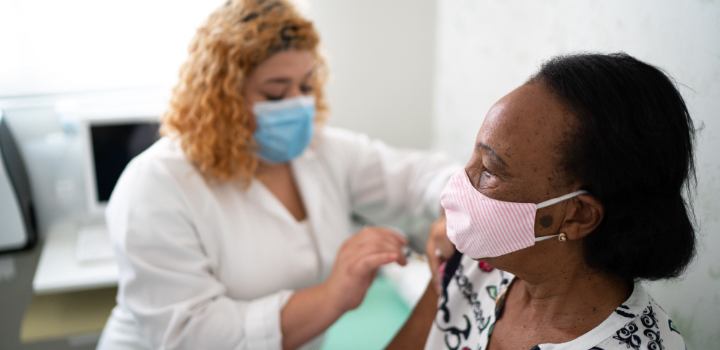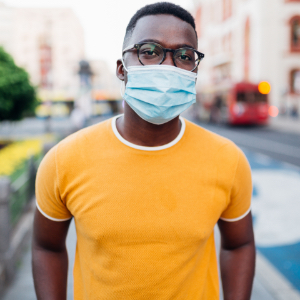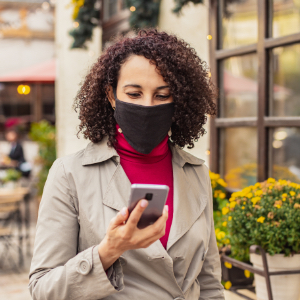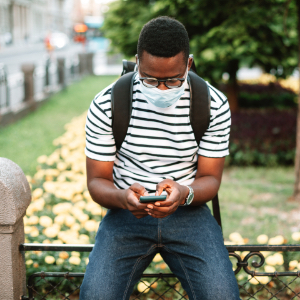Can COVID-19 vaccines cause COVID-19 illness?

There is no link between being vaccinated against COVID-19 and developing COVID-19 disease. If people test positive for COVID-19 in the days after they get vaccinated, it's most likely that they contracted the disease before being vaccinated. However, they were probably not aware they had it at the time of their vaccination. Let's explore this issue.
Third wave of infection coincides with phase 2 of our national vaccination programme
South Africa was confirmed to be in a third wave of COVID-19 infection on 10 June 2021.
"COVID-19 infections in this third wave have been driven mostly by the most transmissible COVID-19 viral variant to date - the Delta variant," says Dr Noluthando Nematswerani, Head of the Discovery Health Centre for Clinical Excellence. "This variant passes from an infected person to others more easily than previous COVID-19 variants (versions of the COVID-19 virus)."
- Compared to the Beta variant (which drove the country's second wave of infection in late 2020 and early 2021), the Delta variant is roughly 30% to 60% more infectious. This explains why our third wave of infection saw the number of COVID-19 infections exceed those recorded in both the first and second wave. There is no evidence that indicates that the Delta variant causes more severe COVID-19 disease than other variants.
"At around the same time as cases began to build up, leading to confirmation of a third wave of infection, our country launched phase 2 of the national mass vaccination rollout on 17 May," says Dr Nematswerani. "This means that just as we began to vaccinate people over the age of 60 with a first dose of the Pfizer-BioNTech vaccine, we saw a spike in people contracting COVID-19 in the country in general."
"So, the chances of people contracting COVID-19 and having COVID-19 at the time of their vaccination appointment - without knowing it - certainly increased. This may result in vaccinated people developing COVID-19 symptoms a few days after their vaccine dose. They may wonder whether they have vaccine-related side effects or are in actual fact ill with COVID-19."
"We must also keep in mind that we are still relatively early into our national vaccine rollout. We have administered around 5.5 million vaccines as at 20 July, out of a total of 41.7 million adults who we hope will be vaccinated by the end of our rollout," adds Dr Nematswerani.
Protection from being vaccinated against COVID-19 is not immediate
The single-dose Johnson & Johnson COVID-19 vaccine and two-dose Pfizer-BioNTech vaccines being rolled out in South Africa both offer good protection against developing severe COVID-19 disease. They also offer protection against the highly transmissible Delta variant.
- Find out more about the Delta variant and about how available COVID-19 vaccines protect against COVID-19 variants in general?
Dr Nematswerani clears up confusion around when vaccine-induced protection sets in. "The immune response starts to kick in as early as two weeks following the vaccine dose. The body continues to build up an immune response over time thereafter. This immune response reflects the protective nature of COVID-19 vaccines. It allows a person to adequately fight off COVID-19 if they are exposed to and contract the disease after being vaccinated."
All in all:
- A vaccinated person can contract COVID-19 in the first three weeks or so after their vaccine dose. This can lead to severe or critical illness.
- This does not mean that the vaccine is ineffective, or that they got COVID-19 from the vaccine.
A person is considered fully vaccinated (at the full levels of protection offered by their COVID-19 vaccine):
- Two weeks after their second dose of the Pfizer-BioNTech vaccine (which is administered 42 days or more after the first dose).
- 28 days after their one-dose Johnson & Johnson vaccine.
Let's recap the differences and similarities between vaccine side effects and the symptoms of COVID-19 illness
-COVID-19 vaccine side effects include pain, redness and swelling at the injection site, tiredness, headaches, muscle pain, chills, fever or nausea. These can start within a day and last for two to three days after vaccination. If symptoms last longer than three days, it's important to chat to your doctor about this. Read more on vaccine side-effects.
- Read more on Pfizer-BioNTech COVID-19 overview and safety
- Read more on Johnson & Johnson's Janssen COVID-19 overview and safety
-Symptoms of COVID-19 disease include coughing (especially a dry cough), fatigue, fever, shortness of breath, sore throat, muscle or joint pain, body chills, headaches, nausea or vomiting or diarrhoea. These may develop within five to six days after exposure to the disease. Read up on the signs of COVID-19 disease.
-The main difference between vaccine side effects and COVID-19 symptoms
"While there are some post vaccine side effects that may be similar to symptoms of COVID 19 disease, it's important to note that the symptoms of COVID-19 will continue for longer than two days. Of course, if we know we have been exposed to someone who has contracted COVID-19, the chances that the symptoms could be COVID-related are far higher. In this case, please quarantine at home and consult with your doctor for guidance on COVID 19 testing," says Dr Nematswerani.
-Mandy Rodrigues lost her mother to COVID-19 disease shortly after her mom was vaccinated against the disease. Mandy bravely shares her take on these events.
COVID-19 vaccines will never result in or give you COVID-19 disease.
"It is impossible to contract COVID-19 from a COVID-19 vaccine," says Dr Nematswerani. "To really understand this, it's important to emphasise how the Johnson & Johnson and Pfizer BioNTech vaccines work. They both put our immune system into a position to "foresee", "recognise" and develop antibodies against the real virus without actually encountering it. That means that if we contract COVID-19 once we're vaccinated - which is entirely possible - our immune system is ready and waiting to overcome the virus before it can do any harm."
The difference between these vaccines is in the way that the instructions to make the spike proteins are delivered:
-The two-dose Pfizer-BioNTech vaccine is an "mRNA vaccine"
mRNA vaccines contain mRNA (short for messenger RNA). The vaccine delivers mRNA into our bodies. It guides our own cells to produce spike proteins similar to those that appear on the surface of the virus that causes COVID-19. The appearance of these spike proteins on cells in our body triggers an immune response that is similar to the immune response we would see if we were actually to become infected with the SARS CoV-2 virus (the virus that causes COVID-19). It trains the immune system to protect us against COVID-19 if we ever encounter it after being vaccinated. The vaccine cannot cause infection of any sort.
-The single-dose Johnson & Johnson vaccine is a "Viral vector" or "DNA vaccine"
Here, a completely harmless virus (called an adenovirus, in no way related to coronaviruses) has been developed to act like a delivery vehicle. It carries the gene that codes for the spike protein that appears on the surface of the virus that causes COVID-19. This harmless component of the SARS-CoV-2 virus is introduced to our bodies when we are vaccinated. It stimulates an immune response that is similar to the immune response we would see if we were actually to become infected with the SARS-CoV-2 virus. It trains the immune system to protect us against COVID-19 ahead of time, if we ever encounter it after being vaccinated.
-Let's recap: What happens once the spike proteins appear on our own cells after we have been vaccinated?
In the case of both vaccines, the appearance of spike proteins on cells in our body triggers an immune response that is similar to the immune response we would see if we were actually to become infected with the SARS-CoV-2 virus. This is how this vaccine trains our immune system to recognise and later protect us against COVID-19 illness if we ever contract COVID-19 after getting vaccinated.
A third vaccine was authorised for use in South Africa on 3 July
-The Sinovac COVID-19 vaccine, (also called CoronaVac), is a two-dose vaccine. It differs from the Johnson & Johnson and Pfizer-BioNTech vaccines. It uses a more traditional vaccine technology to cause an immune response. This type of technology has been successfully used in most vaccines before the development of COVID-19 vaccines. This vaccine delivers an inactivated, whole COVID-19 virus into the body to expose the body's immune system to the real (but dead) COVID-19 virus. There is no risk that the vaccine will cause COVID-19 disease. The vaccine stimulates an immune response that is similar to the immune response we would see if we were actually to become infected with the SARS-CoV-2 virus. It trains the immune system to protect us against COVID-19 if we ever encounter it after being vaccinated.
Should I have my COVID-19 vaccine if I have just had COVID-19, or if I feel unwell for any other reason?
"The guidelines state that we should wait at least 30 days after contracting COVID-19 before being vaccinated against the disease," says Dr Nematswerani. "If you feel mildly unwell for any other reason and COVID-19 has been excluded, you can still be vaccinated. If COVID-19 has not been excluded (so there's a chance you have COVID-19) it is advisable to postpone your vaccination appointment until you have fully recovered."
- Read more: Separating vaccine myths from vaccine truths
Related articles
All medical information found on this website including content, graphics and images, is for education and information objectives only. Discovery publishes content to help to promote a better understand of COVID-19 and COVID-19 vaccinations. The content covered is an overview of key concepts and is not exhaustive in nature. We encourage further reading from other credible sources where necessary.
South African organisations:
- National Department of Health's dedicated COVID-19 portal: https://sacoronavirus.co.za/
- National Institute for Communicable Diseases' (part of the National Health Laboratory Service) dedicated COVID-19 hub
- South African Health Products Regulatory Authority (SAPRHA - part of the National Department of Health).
- South African Medical Research Council (SAMRC)
- South African Medical Journal (SAMJ)
International Organisations:
- Johns Hopkins University
- Harvard Health, Harvard University COVID-19 resource center
- Mayo Clinic COVID-19 resource center
- New England Journal of Medicine (NEMJ)
- US Centers for Disease Control and Prevention (US CDC)
- US Food and Drug Administration (US FDA)
- World Health Organization (WHO)


